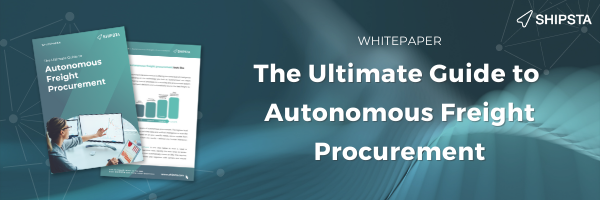The last few years in freight procurement have been some of the toughest in the sector’s history. But other areas of the logistic industry have thrived during this time. One sector in particular that’s exploded since 2020 is logistics tech (aka logtech).
Over the last five years, supply chain technology investment has shot up 400%, from $6 billion to $24 billion. And in the last year, the number of supply chain unicorns (that’s companies with a valuation of over $1bn) more than doubled, from 25 to 51. There’s also been a significant uptick in M&A activity, as larger logistics companies seek to fend off competition and broaden their offering.
So, what’s prompted investors to fund logtech right now?
Disruptions are pushing shippers to become more agile
 Freight procurement has been famously slow to digitise. So when massive disruptions hit in 2020 – which required fast action to overcome – the sector struggled to adapt.
Freight procurement has been famously slow to digitise. So when massive disruptions hit in 2020 – which required fast action to overcome – the sector struggled to adapt.
The fragmented nature of the industry, reliance on manual processes and poor transparency of data made it difficult for businesses to cope as disruption rippled through supply chains.
To increase supply chain resilience, companies across the world rushed to digitise their processes and data, leading to surging demand for logistics software. Investors immediately took notice, accelerating an already growing trend of investing in freight procurement platforms and digital systems.
Investment in freight procurement platforms didn’t wain when lockdowns ended. Just this year, SHIPSTA received $10 million in funding to further accelerate our international expansion. In fact, SHIPSTA’s market growth shows how intense demand from major shippers is: Since our founding in 2019, we’ve already onboarded 100 enterprise clients – a third of which are Fortune 500 companies!
The rapid growth of e-commerce
When the world went into lockdown and brick and mortar shops were forced to close their doors, commerce moved almost entirely online. This massively accelerated the domination of e-commerce, with McKinsey estimating that COVID compressed 10 years of forecasted e-commerce penetration into just three months.
This boom made e-commerce logistics a lot more complicated and drove a massive uptick in demand for last-mile delivery, warehousing and reverse logistics. Startups began jumping onto the market demand for faster and smoother e-commerce transport, delivering software that improves today’s systems – and investors took notice. VCs even started funding warehousing startups they considered too risky in the past.
Across the e-commerce world, investors are still pouring funding into startups they hope will be the next big unicorn. And with economists proclaiming the 'death of the highstreet' has already happened - there's little chance investment will slow.
Supply chains are becoming increasingly complex
VCs were looking at supply chain tech long before disruptions from Covid and port congestion hit. In 2017, FreightWaves reported that ‘the logistics tech boom was just getting started', despite the initial wave of investment beginning in 2011-2012.
Investors took notice of both industry growth and logistics’ multi-trillion-dollar potential – noting that there was ample opportunity for new digital startups in the increasingly complex sector.
The disruptions that hit in recent years have simply accelerated funding that was already starting to boom. And with market disruptions forecasted to continue, we're likely to see plenty more funding pour into the sector.
Want to learn about the latest technology investors are excited about? Download the eBook to learn all about autonomous freight procurement.



